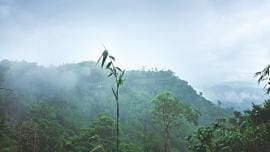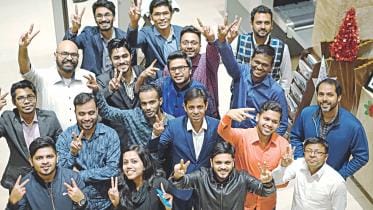BANGLADESH IN THE AGE OF DIGITAL PRIVACY
13 February 2020, 18:00 PM
Lifestyle Evolutions
Vanishing boundaries of digital privacy
13 February 2020, 18:00 PM
Lifestyle Evolutions
The local adventurer’s beginner list
13 February 2020, 18:00 PM
Lifestyle Evolutions
The Internet: Transforming every lifestyle
13 February 2020, 18:00 PM
Lifestyle Evolutions
Through the Traveller’s Eyes: Adventure in Bangladesh
13 February 2020, 18:00 PM
Lifestyle Evolutions
Facebook and commerce: the unforeseen boom
13 February 2020, 18:00 PM
Lifestyle Evolutions
Adventure Travel in Bangladesh
13 February 2020, 18:00 PM
Lifestyle Evolutions
Apps to ease your lifestyle
13 February 2020, 18:00 PM
Lifestyle Evolutions
Meet Bangladesh
13 February 2020, 18:00 PM
Lifestyle Evolutions
lifestyle files / Realities of a virtual world
13 February 2020, 18:00 PM
Lifestyle Evolutions
BANGLADESH IN THE AGE OF DIGITAL PRIVACY
The world’s first data privacy statute was passed in Hesse (a German “lander” or state) in 1970; the United States followed suit shortly thereafter when it included privacy protections in the Fair Credit Reporting Act in 1971.
13 February 2020, 18:00 PM
Vanishing boundaries of digital privacy
Your only recollection is that a few days ago, you had exchanged a text with your friend about getting together for a quick morning chat. From that single exchange of information, the ever-helpful and always-listening ubiquitous virtual assistant has set up a new routine, without giving away much to let you know of the steps it has taken.
13 February 2020, 18:00 PM
The local adventurer’s beginner list
The most obvious location for adventure tourism in Bangladesh is the wild hilly region in Chattogram.
13 February 2020, 18:00 PM
The Internet: Transforming every lifestyle
The Internet has completely rewritten our way of life, revolutionising the concept of communication, and by extension, the entirety of society, to a point where that it is just about our only preferred method of communication.
13 February 2020, 18:00 PM
Through the Traveller’s Eyes: Adventure in Bangladesh
One chilly winter night nearly 20 years ago, a group of young men carefully herded a bunch of young children over dark dirt roads in a remote-ish village.
13 February 2020, 18:00 PM
Facebook and commerce: the unforeseen boom
One of the advantages of the site to the Bangladeshi masses has been its unexpected commercial potential, connecting buyers and sellers on a quick and personal level instantaneously.
13 February 2020, 18:00 PM
Adventure Travel in Bangladesh
The mostly untapped resources for adventure travel here lie in the unspoiled bits of nature in the flatlands, the huge meandering waterways, the verdant hills in the southeast, the various remote villages all over the country, and the numerous varying ecosystems, the char regions.
13 February 2020, 18:00 PM
Apps to ease your lifestyle
The new technology age, if shaped in a responsive and responsible way, could catalyse a new cultural renaissance that will enable us to feel part of something much larger than ourselves — a true global civilisation.
13 February 2020, 18:00 PM
Meet Bangladesh
It was not that long ago when travelling just meant going to one’s ancestral homes. Then again, there were not many options available for families or friends during the long stretch of Eid and Puja holidays. The denizens of the upper echelon had the opportunity to go overseas, but even they were a handful in number.
13 February 2020, 18:00 PM
Realities of a virtual world
For better or for worse, our everyday lives have changed forever. Our lives are now seemingly wrapped by giant leaps in technology that takes us closer to a science fiction prophesy.
13 February 2020, 18:00 PM
Trends by the decade
I just love the yesteryears! The previous generation were so stylish that it’s almost incomprehensible. I still fail to understand how they managed to ace every look with precision. Every decade was distinct and could be separated from the others, simply based on fashion trends and styling.
13 February 2020, 18:00 PM
Too much of a good thing
Eating out is probably the easiest way to get a full meal, without bringing a full hassle into one’s home. Yet, rising issues over daily intake of processed food cannot be ignored. While we have a deep-seated love for all the franchises that are (and to be) it is best to take small steps, or rather, bites in this case.
13 February 2020, 18:00 PM
The food franchise story
You don’t need to have a marketing degree to understand why an international food franchise will work (or slump in cases). Pricing, food quality, placement, delivery services, and above all — the voice of the people, are all it takes. After all, novelties wear off over time, but the great food always remains, be it a local eatery or a multi-storeyed, high-tech food place!
13 February 2020, 18:00 PM
Culinary revolutions of the decade
In an attempt to make sense of this chaos, what would you say were the trends Dhaka’s gastronomic scene saw in the past decade — the top 10 culinary revolutions of the 2010s?
13 February 2020, 18:00 PM
Are you a Dhakaiite?
Simply put, anyone who has been living in Dhaka is a Dhakaiite. But we would say this is a rather narrow and dull definition. Being a citizen of this city is no easy feat. Dhaka is one big challenge! And yet, we stick to it, fighting every day, and also reaping the benefits of living in the capital.
13 February 2020, 18:00 PM
Dhaka depictions: A city through artists’ eyes
We have a constant love-hate, or bittersweet relationship with our city. And one cannot deny that despite all the flaws which make the capital unbearable at times, there is a charm and beauty to it.
13 February 2020, 18:00 PM
Stuck in the web: How ok is our digital life
With every yang, there is always yin, and the Internet has its chock full of yin. When something as influential and far-reaching as the world wide web exists in our lives, you can bet there would be consequences, especially when taken to the extreme or in the wrong hands.
13 February 2020, 18:00 PM
IMPORTANT START-UP VOCABULARY
Angel Investors: An investor primarily involved in early start-up investment. Often, a one-off investment, made by family or friends, to help a start-up founder get a project up and running, or a cash injection to help a business weather through a difficult period.
13 February 2020, 18:00 PM
A game of investments and start-ups
Fasten your seatbelt and embrace the process. Be optimistic and have fun with it. Remember, you will never fail – you will either succeed or learn.
13 February 2020, 18:00 PM
Start-ups: By the young and the brave
Shiny leather bags stacked on storage racks, waiting to be exported thousands of miles across the seas; that’s perhaps an everyday scenario for Taslima Miji, someone who had a very humble beginning with her start-up, Gootipa.
13 February 2020, 18:00 PM

























